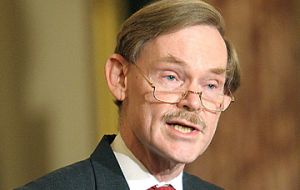MercoPress. South Atlantic News Agency
EU and US debt crises contagion threatens developing world investor confidence
 World Bank president Zoellick recalled that emerging markets have been engines of global growth since 2008
World Bank president Zoellick recalled that emerging markets have been engines of global growth since 2008 The head of the World Bank on Monday said a drop in investor confidence was already feeding through to developing nations from a growing debt crisis in advanced economies and urged “cooperative action.”
World Bank President Robert Zoellick said stock markets in developing countries have been hit and capital inflows have slowed since August when the Euro zone's debt crisis worsened and S&P cut the United States' prized triple AAA-rating.
“The events of August have started to show the signals of contagion to emerging markets,” Zoellick told reporters ahead of meetings of global finance leaders in Washington this week.
Foreign direct investment to developing countries was holding up so far but the World Bank was closely monitoring developments, he said.
“A new and larger risk looms. The drop in markets and confidence could prompt slippage in developing countries' investment and a pull-back by their consumers too,” Zoellick said.
While it was still early, data from developing economies for purchasing manager indexes, which gages sentiment in manufacturing and services, already showed a decline.
“That leads us to contemplate and to watch closely in data over the next couple of months is whether the effects you've seen on the confidence numbers in Europe and the United States are also starting to flow through to businesses and consumers in Asia or other emerging markets,” he added.
He said poorer countries had less fiscal space compared to 2008 to counter an economic downturn and some were “walking a monetary policy tightrope” trying to balance inflation pressures and risks associated with advanced economies.
Developing nations and emerging markets have been engines of global growth since the devastating 2007-2009 financial crisis. Any slowdown in economic growth in those countries could be a further setback to an already fragile global recovery.
He said higher global food prices were putting additional pressure on the developing world. Global food prices are 26 percent higher than a year ago, very close to the record prices of just three years ago during the last food price crisis.
Zoellick said the Euro zone has to face fundamental questions not only about its liquidity problems but also sovereign debt, banking sector stability and competitiveness of member states.
Finance ministers and central bankers from the Group of 20 leading nations meet on Thursday in Washington to discuss global economic developments, followed by meetings of the International Monetary Fund and World Bank that extend into the week




Top Comments
Disclaimer & comment rulesCommenting for this story is now closed.
If you have a Facebook account, become a fan and comment on our Facebook Page!